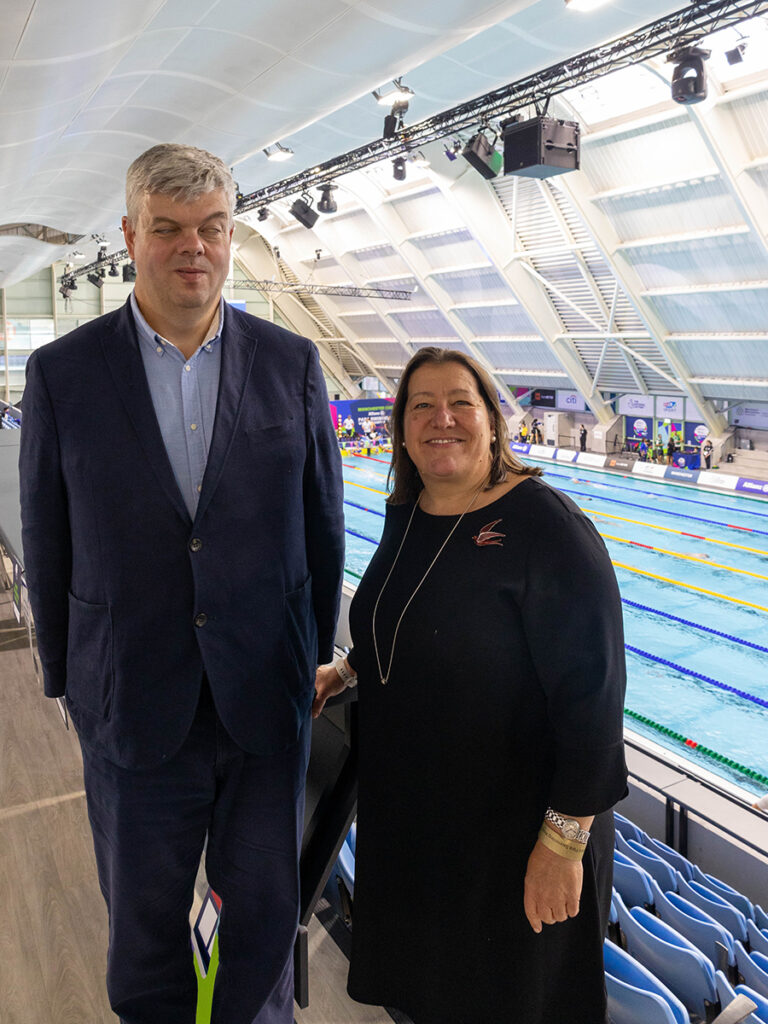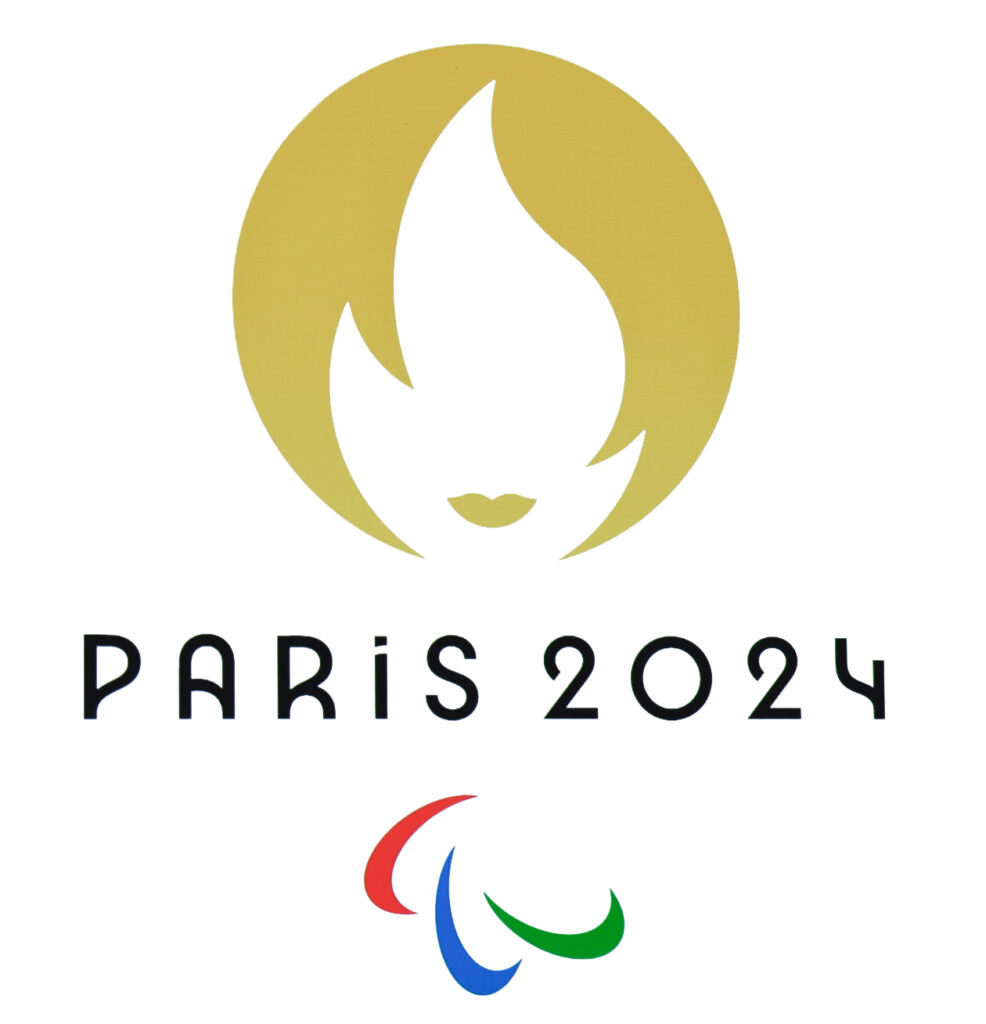As we move towards the Paris Paralympic Games in 2024, Able Magazine speaks with former Paralympian and recently appointed Chief Executive of the British Paralympic Association (BPA), Dave Clarke and his opposite number, Chief Executive of UK Sport, Sally Munday.
Interviews by Tom Jamison

Do you feel it’s important the chief executive of the BPA is a disabled person, or is it just nice to have?
DC – Fundamentally, I think the organisation needs the best person it can find to run it, and I think it is extremely positive when that person is also disabled.
For me, this is what I would describe as a dream role because I absolutely love the movement that we are part of, and what that’s done for me in my life, and what I’ve seen it do for countless others; not just in sport, in wider society as well and what it continues to do.
Although you’re the chief executive, would you like to, ideally, be a bit closer to the sport?
DC – Thanks to colleagues at UK Sport, there’s enough sport going on with the events being held across the UK prior to the Paralympics to mean that I’m definitely getting my dose of sport, that’s for sure. In my first months, I think it’s really important for me to spend time with the key stakeholders, such as the national governing bodies and really get that relationship built with those guys, as well as our corporate sponsors, our philanthropic sponsors, and the wider agencies, such as UK Sport, that fund what we do. And then also communicate with our athletes, because without our athletes and their stories and performances, we have nothing.
We want to produce the best prepared team to produce those performances at the Games that creates that gold dust that we can spread around – and it gives us the currency to change society off the field of play, and change how people behave and attitudes towards disability, which, as a disabled person myself, I’ve faced throughout my life.
Plenty of non-sporty disabled people have been asked ‘Why can’t you do that?’ in relation to parasport. Can we discuss the challenges regarding the relationship between disability and the Paralympics?
DC – I suppose that what you’ve just described is no different to the average person in the street being like Dina Asher-Smith.
I think what’s important is that, the currency we create through those performances, and to make sure that people are comfortable in that world and how they get to those performances, is used to show that other parts of society be that education, employment, health, social inclusion and financial independence, ought to be equally possible and it should act as a beacon to other parts of society, frankly, to get their act together.
SM – I think one of the challenges that we’ve got in the UK, is that we’ve become very, very good at Olympic and Paralympic sport. And because of that, there’s a bit of a myth that it’s actually quite easy to do. And it isn’t. These people, whether Olympians or Paralympians, are exceptional human beings and they’re trying to become the best in the world at something that is incredibly challenging. And in Paralympic sport it’s probably harder because so many other nations now are taking Paralympic sport seriously, and actually are becoming more competitive.
We’re just about a year away from Paris 2024. What specific projects and ideas are you looking forward to working on?
DC – It’s really important that we continue to showcase the performances of our athletes and continue to allow fans to get closer to our athletes through the podcasts we do and the Get Set programme. We’ve got a number of different aspects we’re looking at, from having an awareness of what it takes to be an Olympic or Paralympic athlete, through to some of the understanding around disability and understanding that whole approach to disability, how those attitudes are formed, and what we can do to make sure they’re positive.
Then of course, we have several parasport championships effectively, sometimes across multiple sports, such as the World Games. It’s an absolutely unique opportunity to demonstrate again, firstly what’s happening on the field of play, but secondly, the impact and the message that’s bringing to those cities and societies where those events are happening.
SM – It’s really important to us at UK Sport that when we’re deciding which events we’re going to invest in, that bids for events start with thinking not just about the moment and time when that event is on, but the impact that it can have in the lead up to that event and what’s going on afterwards. All that sort of social impact work is really important but there’s also a whole range of things that come with home advantage. It engages the British public again with Paralympians who are going to be on our screens next summer.

Last year, 2022, was the anniversary of what was a landmark Paralympics. Do you think there was enough done to celebrate that anniversary? Or do we need to be moving away from thinking about 2012 as the high watermark of what we can achieve?
DC – I went to a couple of events myself, and it’s absolutely right and proper that we do celebrate what was an incredible moment in time. But having set that benchmark, it needs to be an historic benchmark. Our ultimate focus should be on what comes next. And what comes next, I think is going to be an amazing Games in Paris, which should be well beyond London in terms of performances and off field impact, because we’re 12 years further on.
SM – You only have to look at what we achieved in Tokyo. Our Paralympic athletes won medals in 18 sports, more than any other nation. I think that’s a really great reflection of how we’ve continued to be successful in the Paralympic space, but ambitions for what can be done moving forward are probably even greater.
Can we discuss the challenges of being a chief executive who is not able to see people shrug their shoulders or roll their eyes when they disagree with you, and so on? How does that play out?
DC – The glib answer would be to say I just crack the show on regardless, but the reality is that body language isn’t just visual. It’s physical. When people roll their eyes, they move in a certain way. There’s a lot about tone of voice, there’s a lot about engagement. There’s a lot more to it. I guess, just over time, as you adapt to your disability, you learn to codify this stuff. Disabled people, in my experience, are incredibly adaptable.
This is why I talk about the asset of disability. Just to live the everyday life of your choosing, you have to adapt, you have to problem-solve, you have to react to change, you have to come up with innovative methods. So, the first thing I did as part of the office culture was to write to my colleagues and say, hey, you’ve probably never worked with a blind person before. Anything you want to know, just ask – and you’ll probably see me bump into the odd thing from time to time, but hey, that’s life… And just try to encourage that conversation.
I appreciate not everybody is as comfortable with their disability as I am, and not everyone is comfortable with talking about it in the open and people need to respect that. Even I get hit with some invasive questions when I’m out and about: ‘Now’s not the time, my friend, we’re in the middle of a road and I’m trying to cross and you’re asking me a weird question!’ But, I think if we want people to acquire the knowledge, and we want people to know what the right thing to do is, then being open and trying to have conversations about it is the only way we’re going to move it forward.
I hope you’re not grimacing at that answer, by the way..!
What’s on your immediate to-do list?
DC – I’ve described it as having three buckets of stuff to deal with. The first bucket of things is to make sure that the current business of the organisation, particularly in terms of preparations for Paris, and Milan Cortina (Winter Paralympics) are carried off without any balls being dropped or any momentum being lost. The second thing is to ensure we have a really strong run up to Paris and make sure that we get the team there in the best possible place and have an amazing Games. And then the third element is the longer term stuff, which is the part about how we really start to demonstrate the social impact part of our strategy and how we secure the long term funding of Paralympic sport in what are going to be a couple of very expensive cycles through LA and on to Brisbane and keeping that momentum between those peaks, as it were.
We need to be really careful not to take any of what we’ve achieved for granted, in terms of our talent pipeline and encouraging grassroots to get moving right through to the elite side of sport – and that we continue to push society as a whole, but also to reach out and show the opportunities exist.
We want people to feel empowered by what we’re doing here. The whole purpose of it is to use that currency to change other parts of society that haven’t changed in the way that sport for disabled people has. So, it’s really important it’s seen as a positive thing – and where those attitudes go slightly offline shall we say, they need fixing, and we can help fix those approaches.



